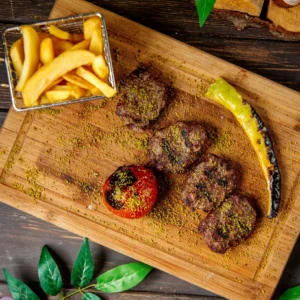Her gün 10:00 - 22:00 arası, Son bilet alım 21:15.
Turkish Manti
Turkish manti is a traditional dumpling dish filled with spiced meat and topped with garlic yogurt and butter sauce, a true taste of Anatolia.
Kategori Others
Manti is undoubtedly one of the most cherished, missed, and talked-about dishes in Turkish cuisine.
The Delicious Taste of Anatolia Manti
When my mother used to say “I’ll make manti today,” the kitchen would instantly become a busy workshop. The table would be dusted with flour, and small squares of dough would be neatly lined up. I’d help place the meat filling, and she would fold them. We’d often hear the phrase: “If forty manti fit on one spoon, it’s done right.” Nobody really counted, but we all tried. These little folded dough parcels appear in various forms across different regions of Turkey, each with its unique touch and story.
Every Region Adds Its Own Flavor
Kayseri-style manti is perhaps the most well-known. The dough is rolled out thin, cut into tiny squares, and filled with a small amount of meat. It’s served with plenty of garlicky yogurt. Whether forty fit on a spoon or not, the flavor alone is unforgettable.
Tepsi manti (baked tray manti), another signature dish from Kayseri, is baked in the oven and stands out with its elegant presentation and rich taste.
Sinop-style manti is larger and often served with walnuts, sometimes topped only with a buttery sauce. Bosnian manti is baked and flavored with meat broth. Even Georgian “khinkali” is considered a cousin of Turkish manti. The common thread? Craftsmanship.
Making Manti at Home
Making manti at home takes time, yes — but what you get in the end is more than just a dish. It’s the laughter around the table, the kids scraping the last of the yogurt, the guests asking, “Can I have just a bit more?” That’s the real reward.
Ingredients for the Dough:
- 2,5 cups of flour
- 1 egg
- 1/2 cup of water
- 1 tsp salt
Filling:
- 200g ground beef
- 1 small onion,grated
- Salt,black pepper
Topping:
- 1,5 cups strained yogurt
- 1 clove garlic
- 2 tbsp butter
- 1 tsp tomato paste
- Dried mint, red pepper flakes
Preparation:
In a bowl, mix flour, egg, salt, and water until a soft dough forms. Let it rest for 15–20 minutes. Roll the dough thin and cut into small squares. Place a bit of filling in the center of each square and fold into little parcels. Boil the manti in salted water until cooked. Meanwhile, mix yogurt and crushed garlic. In a small pan, melt butter, add tomato paste, and stir in spices. Plate the cooked manti, top with yogurt and butter sauce, and sprinkle with red pepper flakes.
Manti Is More Than Just a Meal
Manti is more than food it’s a reason to gather. Whether you’re three or ten at the table, manti brings people together. If you’ve frozen a batch the day before, it’s a perfect last-minute meal for surprise guests proudly served as “homemade manti.” These little dough parcels don’t just satisfy hunger; they carry memories and bring people together.
The History of Manti: From Central Asia to Anatolia
The origins of manti date back to Central Asia, where nomadic Turks created these meat-filled dumplings. Over time, the dish made its way to Anatolia and evolved with local tastes. Even the word “manti” is of Mongolian origin. While similar to Asian dumplings, Anatolian manti is thinner, more refined, and more labor-intensive making it unique. Records of manti recipes exist from the Seljuk era, and it even reached the tables of the Ottoman palace. The famous traveler Evliya Çelebi mentioned manti during his journeys. Wherever you go in Turkey, manti evokes a sense of familiarity it’s a dish shaped by memory and made with love.
Tips for Making Perfect Manti
- Dough thickness matters: Too thick becomes heavy, too thin tears during cooking. Find the sweet spot with practice.
- Avoid a watery filling: Squeeze excess moisture from the grated onion. A dry filling cooks more evenly.
- Proper folding is key: Secure the edges well so the dumplings don’t fall apart while boiling.
- Don’t forget salt in boiling water: This ensures the manti itself is flavorful.
- Finish with the right sauce: Garlic yogurt is essential, but not overpowering. Top with melted butter, red pepper flakes, and a touch of mint for the perfect balance.
Ziyaret Saatleri
Her gün 10:00 – 22:00, Son bilet alış 21:15.
Yeme-İçme
Her gün 11:00 – 21:00
İletişim
Emaar SkyView – 2024 Tüm Hakları Saklıdır – Emaar Grup
Gizlilik Politikası / Kullanım Koşulları




